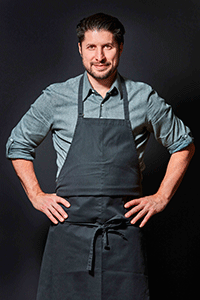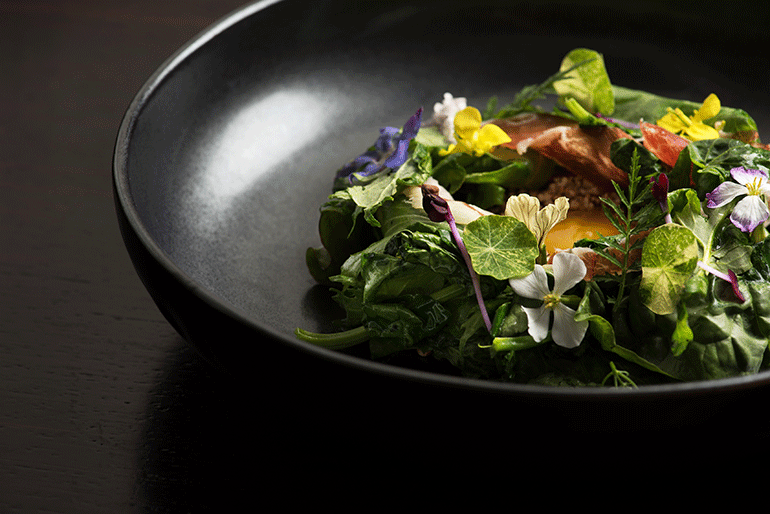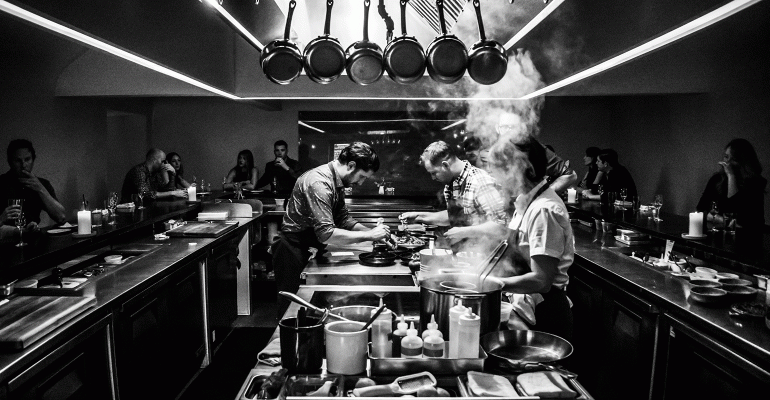Ryan Poli says he’s having the time of his life at The Catbird Seat.
“We’re crushing it, man,” said the executive chef at this 22-seat theater-in-the-round restaurant perched on the second floor of a building in midtown Nashville.
Now in his third year at the restaurant, Poli and his team do just eight services a week, at 5:30 and 8:30, Wednesday through Saturday, generally booked 30 days in advance. Guests spend $115 each, before beverages, to sit in a ‘U’ shape around the open kitchen where Poli, with the help of sous chef Leina Horii and their team, pours his years of discovery, self-loathing, rediscovery and redemption into the food.
The restaurant’s closed Sunday through Tuesday.
Photo by Jeff Kauck
 “It sounds like three days off, but it’s really not. Well, it is, but on Sunday we’re so mentally drained, because we’re cooking and serving people. It’s like we’re hosting a dinner party every night. You’re constantly entertaining and telling stories. By the time Saturday night comes along, everybody’s so brain dead. I don’t really leave the house.”
“It sounds like three days off, but it’s really not. Well, it is, but on Sunday we’re so mentally drained, because we’re cooking and serving people. It’s like we’re hosting a dinner party every night. You’re constantly entertaining and telling stories. By the time Saturday night comes along, everybody’s so brain dead. I don’t really leave the house.”
Working with his younger brother Matthew, the restaurant’s beverage director, Poli has made a home for himself and is truly in the prominent and enviable position that “catbird seat” describes.
It took him awhile to get there, though.
A native of the south side of Chicago, Poli took an early interest in fine dining with stints at Le Français in Chicago under Jean Banchet and at The French Laundry in Yountville, Calif., under Thomas Keller, before gaining a name for himself, first as the chef of Butter and then at Perennial. He then joined Mercadito Hospitality and opened Tavernita and ran other restaurants for them before he just got sick of the whole thing.
That was 2013.
“I didn’t even know if I wanted to cook anymore,” he said.
He canceled his cable TV, stopped buying Air Jordans and eating out and started saving money. Then he sold his share in Tavernita back to the owners, rented out his condo and hit the road.
He found some good mentors, starting in Philadelphia with one of the greatest chefs in the country, Marc Vetri, at one of his restaurants, Osteria.
He just worked the line there. Vetri and Osteria’s then-chef Jeff Michaud, helped him get his confidence back, Poli said.
“They were so kind and they were so gracious to me. …. And it was interesting to see a guy like Marc, who’s an established, well-respected chef … had the same kind of problems that I was having.”

His next stop was Blue Hill at Stone Barns with chef-owner Dan Barber.
As one does at Stone Barns, Poli read about food and spoke to farmers, something he still does today, buying local greens that, for one dish at Catbird, he half-wilts in brown butter with sherry vinegar and serves with a sous-vide egg cured in a fish sauce he makes from tuna trim.
Poli learned to make that fish sauce on the next leg of his trip: He emailed René Redzepi — chef of the most high-profile restaurant in the world at the time, Noma in Copenhagen — with whom Poli had worked at The French Laundry.
Redzepi put him to work in the test kitchen.
“I had no idea what they were talking about. At all,” Poli said. “I was so in over my head.”
But soon he was fermenting with the best of them, making miso and koji and getting a grasp of what was going on. The two months he’d planned to spend soon became four, “and then they invited me to go to Japan, and I had to do that.”
That was followed by backpacking through Southeast Asia. Poli finally ended up in Australia under the wing of Dan Hunter at Brae restaurant.
“I woke up one morning and I thought, ‘I think it’s time to go back,’” Poli said.
Back in the U.S., Poli heard that Trevor Moran was leaving his job as executive chef of The Catbird Seat.
“I called everybody I knew who knew the owners and I just did everything I could to get in front of them.” Poli said. “Trevor was a big help in getting me an interview and doing a tasting for them. It happened really fast.”
Now his years on the road are being put to work with dishes such as raw geoduck clam with butternut squash that’s steamed with walnut oil.
That’s served with a compound butter made with clam juice reduction, cream and pumpkin juice emulsified with butter and xanthan gum, served chilled.
From Vetri, and also Japan, comes a pasta dish. The pasta has ground wakame seaweed in it and it’s tossed in butter emulsion, yuzu, lemon and yuzu kosho and garnished with Maine scallops that have been cold smoked and then dehydrated for three days. That’s shaved over it, like Japanese bonito flakes or Italian bottarga.
“There’s no set boundaries to what we’re doing. We’re just trying to create delicious food in a delicious setting,” he said. “It’s a dream job.”
Contact Bret Thorn at [email protected]
Follow him on Twitter: @foodwriterdiary





